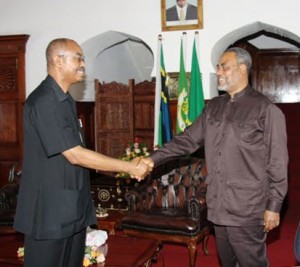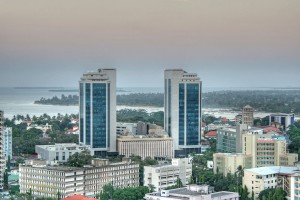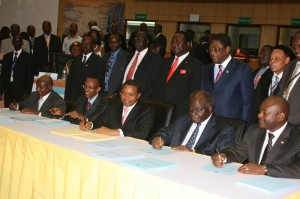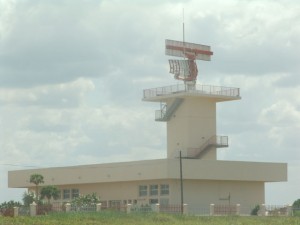There was considerable excitement in Zanzibar on November 5 2009 when it was revealed that the Secretary General of the leading opposition party (the Civic United Front – CUF) Seif Shariff Hamad, whose party won all the elected posts in Pemba in the 2005 elections, had met for two hours President Amani Karume of the ruling Chama cha Mapinduzi (CCM) party, behind closed doors. It was the first visit Hamad had paid to Karume since he had refused to recognise him as the islands’ President after the controversial elections in 2005.
A State House press release said that the two leaders had discussed various matters including the need to ‘maintain peace, tranquility, tolerance and cooperation among all people in the islands’. They also agreed on the need for ‘sustainable negotiations’ between them and their parties.
Hostility at Unguja meeting
Shortly afterwards, on November 7, Hamad had to face an angry crowd of his supporters at a rally in Unguja (the main island) when he revealed that his party now recognised the President. As thousands of people started shouting and milling around the podium, CUF Party (national) Chairman Professor Ibrahim Lipumba took to the podium and tried in vain to calm the crowd. Some of them were heard shouting: “You have betrayed us”.
Lipumba said that the matter would next be discussed in party sittings so as to get members’ views. “If they think we betrayed them, we are prepared to be accountable. Maalim Seif (the name by which Hamad is best known in Zanzibar) has been committed to CUF ever since he left the CCM” Lipumba said. According to the Swahili press, which gave substantial coverage to the event, Lipumba pleaded with the crowd but eventually the rally had to be called off and the leaders were driven off through a narrow alley under tight security.
Addressing a rally later in Tanga, Lipumba urged members all over the country to calm down. He said he was aware that members, especially in Zanzibar, were annoyed by the meeting but he assured them that Hamad would never betray them. “I hear some people accuse him of being bribed. This is rubbish for a person like Hamad who has devoted his life to the CUF party and even spent three years in detention. How can such a man be a sell-out?”
Warmer reception in Pemba
Addressing rallies in Pemba, a few days alter, Hamad received a warmer reception. “We took time to ponder with Karume where we were heading” he said “and we came to the conclusion that we had fought one another for far too long.”
Subsequently, CCM leaders, especially those from the Mainland, were asked to keep out of the reconciliation process which had been initiated by Zanzibaris. CUF Director of Foreign Affairs Ismail Jussa told The Citizen that CCM leaders should remain on the sidelines “because they don’t know what is going on.”
Meanwhile, speculation continued as to whether the two leaders had agreed on anything else, particularly on the possibility of power sharing in government.
It wasn’t until November 15 that President Karume finally commented, although the press wanted to know more than he gave them. He said that no eligible voter would be left out in the registration of voters for the 2010 elections. He made the remarks at a time when hundreds of CUF supporters in Pemba were claiming that they had been denied registration for the next elections because they did not hold residency identity cards.
The President, who will not be seeking election again after two terms, added that “We want both the winners and losers to accept the results. This is possible only if the elections are free and fair.” In another development, the President said he would now appoint two CUF members to the House of Representatives in accordance with previous agreements.
“We weren’t supervised by whites”
CUF Deputy Secretary General Juma Duni Haji told reporters that the talks between Seif Shariff Hamad and President Karume were held in secret so as to avoid ‘interference’ by people with ulterior motives. He said the previous ‘Muafaka’ (agreements) had failed, partly because they were sponsored by the donor community. Hamad said everything was now forgotten and forgiven. “Countries like Kenya and Zimbabwe resolved their differences with the help of outsiders but in Zanzibar that was not the case. It is better for locals themselves to resolve their problems with home-grown solutions. That is why, in our case, no white man supervised us.” – Nipashe.
Some uncertainty remains
Although the two parties were showered with praise by all parties in Tanzania and from many in the international community, some doubts were still being expressed as to whether the agreement would stick and, in particular, whether it might lead on to power sharing. Professor Lipumba said they were not sure as everything had been done orally. “It is a political risk we took, so I can’t guarantee that everything will turn out the way we expected.”
Then two Zanzibar government ministers spoke against the idea of a coalition government and power sharing. Deputy Chief Minister Ali Juma Shamhuna and Minister of State in the Prime Minister’s Office (Union Affairs) Mohammed Seif Khatib, differed with President Karume who had said that the issue of power sharing would have to be decided by the people. Minister Shamhuna said that Zanzibar did not need power sharing or a government of national unity. What was needed was for the parties to accept the election results. Minister Khatib told a rally in Pemba that national unity did not necessarily mean co-opting another party into the government. “CCM alone is capable of bringing about unity as that is its policy,” he declared – Mwananchi.




